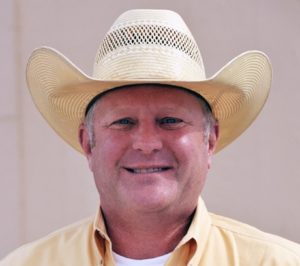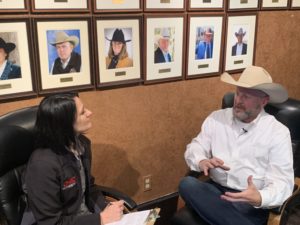
Jay Winborn
How do you revamp and modernize an organization to secure its future yet stay true to its western-heritage roots? It’s a challenge the new NCHA Executive Director Jay Winborn has already begun working on. With experience in business, marketing, event promotion, sporting associations and as competitive horseman himself, Winborn has all the necessary skills and attributes to manage this daunting task.
In part two of our in-depth interview with the new NCHA leader, Winborn divulges more of his plans to restore the Association to its former glory but in a way that is more inclusive for all levels of riders and budgets.
“You’ve got to look to the future where you’re going, but don’t be afraid to look back every once in a while and always try and maintain the integrity of where you came from. And I think you can do that successfully, I was able to demonstrate that at the reined cow horse and then we took a sport that was deeply embedded in the history of California and moved it to Texas. But I also think we did a great job honoring and respecting that history of where it came from and that is no different to what I want to do here.”
Winborn is excited to see the new leveling system being implemented for the first time at one of the major shows during the Super Stakes. He said entries are up and he’ll be looking closely to see how the association can fine-tune the system for everyone.
“[The open] should stand on its own and it should be a very high level event and incorporate sponsorships to feed that and then take care of the rest where you’re not pulling money out of those [lower levels] to feed the top level.”
“I feel the amateurs have their own set of issues and agendas and competition desires that they want as do the non pros and open riders… We need to be able to identify those, to continue to refine what we’re doing and make it more enticing for people to be involved.”
Mindful that the NCHA has been crippled by a lack of planning and knee-jerk reactions when some complaints are received,Winborn said he is willing to say no when he needs to, as well as make the hard decisions and see them through.
“I fall back on my experience at the cow horse a lot because they were very similar organizations and dealt with a lot of the same problems there as I’m dealing with here getting started,but one of the great things I felt there is the cow horse culture did not lend itself to airing its laundry on social media, and I absolutely think social media has been one of the most crippling things to affect the NCHA in the past decade.”
It is a double-edged sword. Winborn feels that social media is also an important marketing tool that needs to be taken advantage of.
“Social media is a valuable tool when utilized properly and it’s great for communication. It’s great for marketing, It’s great for promotion. It’s a great way to showcase your own business, but it also can be a weapon and weaponized against an association or individuals to promote agendas. That’s where I have a problem and we’re going to work hard to kind of get to a point where everybody is compatible with each other. If we disagree, we can sit down and have a conversation and make a phone call and not turn it into a diatribe on Facebook.”
Winborn’s plan includes modernizing processes within the NCHA and streamlining the decision-making process.
“The NCHA has suffered in the past of death by committee in my personal opinion. There’s a lot of good people on the EC (Executive Committee)… I’m not taking for granted their input or their knowledge or what they provide to us. But I joked around… when you get that many people and try to make a decision… I mean on Friday nights my wife and I can’t even agree on a place to go eat dinner.”
While he didn’t elaborate on how much smaller he thought the EC should be to make it more efficient, he did say that those making the decisions should be stakeholders in the sport, and not outside business experts like others have suggested.
“I do not subscribe to the belief that it should be all business people on the EC nor do I subscribe to the belief that it should be all trainers. I think it should be a diverse mix of people and skill sets and no matter what your background, if you’re able to help this association, we want you there.”
Winborn said cutting needs a showcase event like a million dollar cutting. He wants something big and extreme and different from what everyone is used to, to bring some more excitement to the sport.
It would be an event separate to the Triple Crown shows that would bring the top 10 to 20 riders together to compete on aged horses. Dangle a massive purse, crank up the music, and add smoke and lights and Winborn said the end result will be an extravaganza that people get pumped about. The idea is to help turn cutting into more of a spectator sport.
“It’s tough, it’s very tough. And in this day and age it’s become even tougher because there’s a whole lot of different competition and other things going on out there. I will tell you, anybody who watched the reality series The Last Cowboy and what they did in Vegas with the reining and the crowd they had and the excitement they got over it… I think it’s definitely doable here and not to diss reining, but I fall asleep watching a reining. At least cutting has an aspect, the man and beast concept and cutting to me is 10 times more to watch than reining,” he said.

Simone interviewing Jay Winborn
With a background in marketing and event production specializing in extreme game-style sports, Winborn is confident of creating a successful event for cutting.
He floated a number of ideas such as seeing how many cows you can cut in a time limit, or putting bounties on cows, and getting more crowd participation as ways to bring cutting to new and wider audiences. He said the key to a successful event is good planning and putting enough money and promotion behind it.
He said his team is looking at ways to add something new to the Summer Spectacular to boost that show.
“I want to put in a judged flag class for people that are just getting started to where they get the feeling of what it’s like to come to Fort Worth and get a stall and go to the trade show and hang out with say Austin Shepard, Beau Galyean and Phil Rapp and all those icons of our industry. To get a chance to meet them and be a part of that and you get them comfortable with coming and then the next thing you know, they’re showing up to compete in an aged event.”
Winborn also talked about putting on ranch classes and having jackpot cuttings. He said people who come to compete in those events will likely stay to watch the Open final.
While at the helm of the National reined Cow Horse Association, Winborn moved their two biggest shows to Fort Worth, Texas in 2017 which helped raise its profile. But in cutting, some say the sport is too Fort Worth-centric. While Winborn has no plans to relocate any of the triple crown events, he said the idea has some merit for the Super Stakes or the Summer Spectacular.
At the end of the day, Winborn said the NCHA is a customer service business and he wants to ensure that the customers, in this case the members, have their needs taken care of. And while his goal is to restore cutting back to its hey-day, he reminded people that it will take some time and a little trial and error.
“I hope they understand Rome wasn’t built in a day we’re dealing with a lot of stuff here initially. I’ve got a lot of plans that I’m really anxious to get started on but we have a few things in front that I need to take care of first, but we’re going to work towards it. I’ve got a really good team, although we’re kind of young at the NCHA. I’ve got a great CFO, a great show manager. We are getting our marketing and sponsorship departments lined out,” he said.
Brought to you by Cube It
